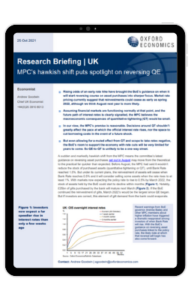UK | MPC’s hawkish shift puts spotlight on reversing QE

Rising odds of an early rate hike have brought the BoE’s guidance on when it will start reversing course on asset purchases into sharper focus. Market rate pricing currently suggest that reinvestments could cease as early as spring 2022, although we think August next year is more likely.
What you will learn:
- Assuming financial markets are functioning normally at that point, and the future path of interest rates is clearly signalled, the MPC believes the
macroeconomic consequences of quantitative tightening (QT) would be small. - In our view, the MPC’s premise is reasonable. Decisions around QT shouldn’t greatly affect the pace at which the official interest rate rises, nor the space to cut borrowing costs in the event of a future shock.
- But even allowing for a muted effect from QT and scope to take rates negative, the BoE’s room to support the economy with rate cuts will be very limited for years to come. So QE-to-QT is unlikely to be a one-way street.
Tags:
Related Services

Post
Food prices to bottom out in 2024, risks skewed to upside
Our baseline forecast is for world food commodity prices to register an annual decline this year, in aggregate, reducing pressure on food retail prices further downstream. However, we believe the risks to this forecast are overwhelmingly skewed to the upside.
Find Out More
Post
Battery raw material prices to recover
Battery raw materials prices bottomed out last quarter and we think a sustained recovery is looming. Midstream EV battery manufacturing activity has picked up again and inventories have returned to historical levels, suggesting upstream demand for raw materials will also bounce back.
Find Out More